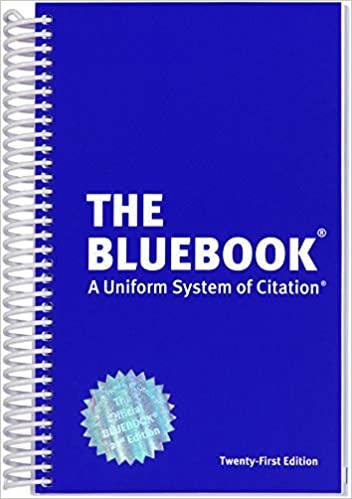Question
. TRUE/FALSE (10 points each) _____1. If a court does not have subject matter jurisdiction in a particular case, then it can only hear the
.TRUE/FALSE (10 points each)
_____1. If a court does not have "subject matter jurisdiction" in a particular case, then it can only hear the case if all parties agree.
_____2. In order to assert negligence you must establish 4 elements.
_____3. A General Demurrer can be filed any time
_____4. A valid method for serving a summons and complaint when the defendant cannot be found, is sending a copy to the defendant by certified mail.
_____5. Failure to state a cause of action is a valid basis for filing a General Demurrer.
II.MULTIPLE CHOICE (10 points each)
______ 6. If there is clearly a "triable issue of material fact" (an ongoing factual dispute) between the parties, then:
- Plaintiff should file a motion for summary judgment
- Defendant should ask for a "directed verdict"
- It is improper for either party to move for summary judgment
- It is improper for either party to engage in settlement discussions
______7. Which of the following statements is true?
- Both hearsay and privileged information are normally discoverable
- Neither hearsay nor privileged information are normally discoverable
- Hearsay is normally discoverable, but privileged information is not
- Privileged information is discoverable and is also admissible in trial
_____8. When, if ever, can a judge exclude evidence at trial which is otherwise admissible.
- Under any and all circumstances
- Never
- When, under Evidence Code Section 352, the "probative value" of the evidence is outweighed by the danger of unfair prejudice to a party, confusing the jury, or taking too much time
- Only when the evidence has no probative value
_____9. When, if ever, are "leading questions" allowed at trial?
- Always
- Never
- Only on direct examination
- Only on cross-examination
_____10. The first element in a negligence case which plaintiff must establish is that:
- Defendant is guilty of a crime
- Defendant intended to harm plaintiff
- Defendant owed plaintiff a "duty of care"
- Defendant made a material misrepresentation to plaintiff.
_____11. Which of the following most accurately describes what "breach of duty" means in a negligence case?
- Defendant's behavior created some risk of injury to Plaintiff
- Defendant failed to use all the care which defendant personally believed was necessary under the circumstances.
- Defendant failed to use that level of care which a reasonable person would have used under the exact same circumstances
- Defendant failed to use perfect care
_____12. Under "Res Ipsa Loquitur" ("the thing speaks for itself"), plaintiff is essentially doing what?
- Using the injury as evidence of breach of duty by defendant
- Using the breach itself as evidence of a "duty of care"
- Trying to establish liability for negligence even while admitting that plaintiff himself is also at fault
- Arguing that defendant is liable even though there was no "breach of duty" by defendant.
_____13. Ted crashes into Jim's parked car. Ted was driving 70 mph while talking on his cell phone in a 25 mph zone.
- Ted committed ordinary negligence
- Ted committed gross negligence
- The crash was an unavoidable accident
- Ted's liability to Jim is the equivalent of an insurer's liability for damage
_____14. Which of the following is not part of the trial stage of litigation?
A. direct-examination
B. charge to the jury
C. filing an appellate brief
D. cross-examination
____ 15. Which of the following is not a standard of proof?
A. preponderance of the evidence
B. weight of the evidence
C. beyond a reasonable doubt
D. clear and convincing
III. SHORT ANSWER ESSAY (20 points each)
1. What is the difference between a general demurrer and a motion to quash?
2. Explain the difference between mediation and arbitration.
3. What is the purpose of IRAC & what is a memorandum of law?
4. Explain in detail the "breach of duty" balancing test normally used in negligence cases, (Do not include a discussion of "Res Ipsa Loquitur").
5. Briefly describe the four major purposes of tort law.
6. How do the following three categories of torts differ: intentional torts, negligence and strict liability torts?
7. What is voir dire?
8. Define reasonable person
9. Distinguish between cross-examination and direct examination
10. What is a Motion In Limne and why is it important.
Step by Step Solution
There are 3 Steps involved in it
Step: 1

Get Instant Access to Expert-Tailored Solutions
See step-by-step solutions with expert insights and AI powered tools for academic success
Step: 2

Step: 3

Ace Your Homework with AI
Get the answers you need in no time with our AI-driven, step-by-step assistance
Get Started


